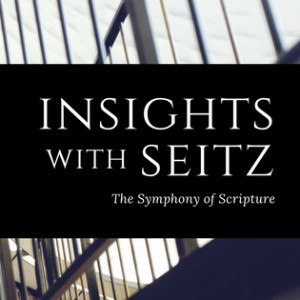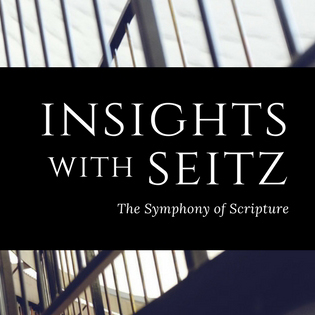Episodes

Wednesday Nov 18, 2020
Second Sunday after the Epiphany, January 17th, 2021
Wednesday Nov 18, 2020
Wednesday Nov 18, 2020
The lessons for the second Sunday in Epiphany come from 1 Samuel, Psalm 139, the 6th chapter of First Corinthians, and John 1:43-51, the calling of Nathanael. This belongs to the theme of Jesus earthly ministry. Following his baptism, he called the disciples.
Two things we should note. The NT reading from 1 Corinthians introduces the sequential walking through this letter we encounter in the Sundays to come. It has not been chosen—like Acts 19 last week--to illuminate the Gospel reading in a specific sense. And as for the Gospel, it is not from Mark but John.
Nothing would prevent there being a four year cycle with each year devoted to one of the four Gospels. But instead we have a three year cycle. John is spliced into significant moments in each of the three years, especially in Easter and Lent. This matches the character of the 4th Gospel, which offers a more penetrating commentary on the narrative line we find in the 3 synoptic Gospels. The beloved disciple remains close to Jesus from first to last and in this posture he sees and reports things he feels need greater attention.
I want to start then with John and the OT passage chosen to introduce his narrative, and then turn to the psalm which has been chosen to illuminate them both.
One effect of hearing any two accounts from scripture set side by side is that the similarities and distinctive features are drawn out through attending to the details of each. You can see this in the case of pairing 1 Sam 3 with John 1, the calling of Samuel and the calling of Nathanael.
In both cases we have the obvious detail of confusion. Samuel cannot tell who is calling him. He keeps getting up to respond to Eli, ‘here I am for you called me.’ Nathanael is not sure how Jesus knew him before having laid eyes on him.
But there are also obvious differences. The boy Samuel obediently waits to hear the LORD’s own voice, as directly instructed by Eli, once he knows what’s going on. Nathanael counters the enthusiast testimony of his friend Philip with a dismissive ‘can anything good come out of Nazareth?’ Samuel is everywhere depicted as good and true. The elder Eli and his sons stand under judgment. Philip and Andrew are agents of spreading the good news. Eli is too, once he catches on to the young boy’s confusion and properly interprets it as a sign of God’s ways. Eli is of course a complicated figure, in contrast to his wicked sons. In the end, he intuits that the silence of Samuel has to do with him and the judgment of God, and he demands that Samuel not hide the truth but speak plainly. And when the verdict is delivered by the obedient Samuel, he obediently receives it as true. ‘It is the LORD. Let him do what seems good to him.” Nathanael’s conversion to the truth follows a different, shorter and more humorous or ironic path.
One place where the stories do seem to converge is over the sovereign timing of God. Jesus identified Nathanael before any human exchange from Philip. “I saw you under the fig tree before Philip called you.” This matches the calling of the LORD to Samuel before he could comprehend what he was experiencing. Samuel did not know the LORD, the narrator tells us. He thought Eli was calling him. Nathanael thought Philip was calling him – and he mocked the testimony. But it was in reality the Lord Jesus himself who saw him and would enlist him with the other followers, overcoming his doubts. And giving rise to the bold confession, “You are the Son of God, you are the king of Israel.”
The calling of the disciples is one of the main themes of Epiphany lessons, coming as it does amidst the manifestation of Jesus to the world, as teacher, healer, wonder worker. He does what he does in the midst of friends and co-workers—who must be trained to understand him and his mission.
John handles this theme a bit differently than the other three gospels. Jesus gradually manifests himself, not only to the world, but to those who will work closely with him, individually, one at a time. First there is the unnamed disciple who along with Andrew stays with Jesus. Then Andrew tells his brother Peter. Then Jesus moves to Galilee and finds and calls Philip in Bethsaida, the city of the brothers Andrew and Peter. Philip finds his fellow Galilean Nathanael and speaks of a conviction shared by the three altogether: ‘we three agree we have found him about whom Moses wrote in the Law and the Prophets.’ Jesus, son of Joseph from Nazareth.
Here, John’s and Jesus’ irony merge. It is the northerner Nathanael who questions the northern home town of Joseph and Jesus as suitable for the one they are testifying to in such grand terms. The one he himself will shortly call Son of God and King of Israel. Philip says only, come and see.
Jesus addresses him and though Nathanael said what he said out of earshot, it is clear Jesus knows what was said. And so he responds in a way that hints at just that. You are an Israelite—you are a Jacob—in whom there is no Jacob, no subtlety and craft, as one would expect from that ancient trickster. You said your mind. Nathanael therefore responds “where did you get to know me?” How did you know what I said and who I am? Jesus says he knew him before he uttered a word. Before Philip called him, just like the boy Samuel, who did not yet know the LORD.
Jesus now refers to an otherwise obscure detail: he saw Nathanael when he was under the fig tree. What fig tree and when, other than sometime prior to Philip’s calling. John has told us nothing about this. Jesus alone knows the time and the place he refers to. He doesn’t infer it, as did Eli with Samuel, but speaks of a very clear place.
Here is where the scriptures open and close both. Is the fig tree a place for studying the scriptures and for prayer, as the rabbis sometimes infer? Was Nathanael reading the law and the prophets and seeking for the one about whom Moses wrote there? Is the fig tree a sign of the coming age of God’s reign as foretold by Micah 4:4, when nations would stream to Zion and swords would become ploughshares and every one would sit under his own vine and fig tree? and so the age to come Nathanael was longing for and awaiting, before Philip greeted him? Is it a place only Christ and Nathanael know and so important for that reason alone, a place that Jesus wants Nathanael to know that he knows, and so he knows him as he is in the privacy that has his name written on it? So he can come to us in the same way, and does. Opening and closing are both ways God can communicate through his word, law and prophet and Gospel account, with its mysterious reference to the fig tree.
But N’s response is all in without any deceit or mystery, by contrast. And Jesus responds even more boldly. There will be a ladder like Jacob’s, and our Israelite without guile will see angels ascending and descending on it. Jacob’s ladder become now Nathanael’s, in the Son of Man standing before him as he upon whom the angels will come and go from heaven.
After hearing the stories of the calling of Samuel and of Nathanael, the psalm for the day really comes alive.
Lord, you have searched me out and known me; *you know my sitting down and my rising up;you discern my thoughts from afar.
Yes, under my fig tree
Indeed, there is not a word on my lips, *
but you, O Lord, know it altogether.
Such knowledge is too wonderful for me; *it is so high that I cannot attain to it.
Your eyes behold my limbsall of them are written in your book; *
The psalm does not just capture the themes. It does not just give us a front row seat on the action. It casts us in the main roles alongside David and Samuel and Nathanael. It gives us voice and participation in the acts of God. We are written in the book. I sometimes wonder if we would do better on a Sunday like this to just read the psalm in unison after the readings and after the sermon for the day.
I mentioned at the beginning that the Epistle reading is part of a continuous reading through the letter—in this case 1 Cor—that we will resume next week and the weeks to come. It wasn’t chosen in the same way as Acts 19 last Sunday. But of course, that isn’t really decisive since all scripture has a word to speak and to come alongside other readings.
Paul is describing the place of fornication and the damage it inflicts. We may believe it is a secret place, but this is exactly why it is so destructive and why Paul sternly cautions us. Our bodies our temples of God’s Spirit. Our bodies are not our own, in fact, but are seen and known and created by God for God. Our under the fig tree life is a life under God and his word, seen by him from afar, lovingly knowing us better than we do ourselves, whether Samuel or Nathanael or the psalmist or you and me.


No comments yet. Be the first to say something!